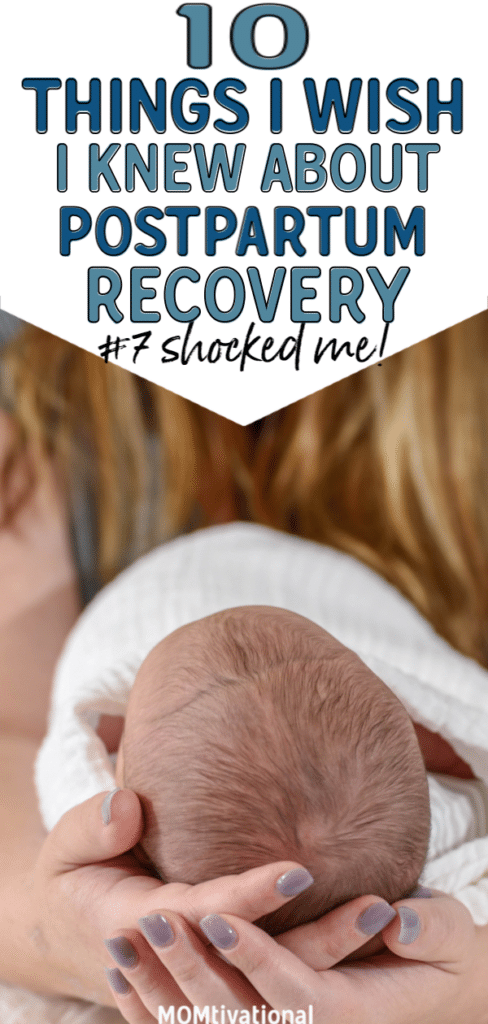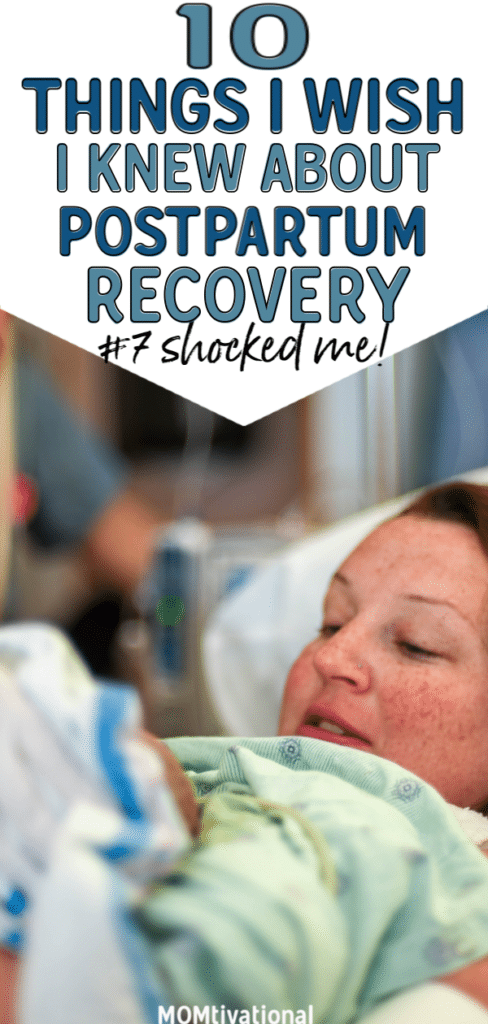I remember when I was naive enough to think that labor was going to be the hardest part about having a baby.
HA!
Once the baby is born, you start a new journey – the path to recovery.
Though it is believed that postpartum recovery is easy in case of vaginal birth, it may not be for all (and definitely wasn’t for me!).
But having a good understanding of what to expect will help you be equipped early on and make your journey better (or at least, less shitty).
Things I Wish I Had Known About Postpartum Recovery
It Takes A While to Get Your Pre-Pregnancy Body Back (And It Probably Won't Look The Same)
Most new mothers are under the assumption that once the baby comes out, the uterus will shrink fast, and you can get back to the pre-pregnancy stage.
Getting the pre-pregnancy body would take weeks, if not months. Your uterus took nine whole months to expand and reach its full term.
You should give enough time for the body to recover and get back to how it was pre-pregancy.
Also, know that your body might never look exactly how it did pre-pregnancy, and that’s okay! Although I lost all my baby weight, I have some pre-pregnancy jeans I just can’t seem to fit in at all.
Those articles of how celebrities got their body back in one month are not true and if they are, you have to be aware they have trainers, nutritionists, and nannies. It isn’t a fair comparison.
The Incision Hurts. A. Lot.
If you had a C-section, then the incision at the lower part of the abdomen can hurt you a lot. This will be more during the initial days after delivery and slowly wanes off as the days go by.
Because of the pain, you will find it very difficult to get up and walk even to the washroom. Sitting and feeding the baby can also be difficult and uncomfortable. You might even require the support of your partner to get things done.
In the case of vaginal delivery, it can vary greatly. The perineum area will be sore for about three weeks and if you tore it can take up to six weeks (or more) to be back to normal.
You should keep the area clean to ward off infection. You can use a squirt bottle to rinse the area and pat it dry.
Sitz Baths Are A Blessing. Do Them!
I had never even heard of sitz baths before my first pregnancy and now I can’t shut up about them.
Seriously, I tell all my pregnant girlfriends about how amazing sitz baths are and the many benefits they provide.
Get some Epsom salt (I like this 19 lb bulk bag), and have a sitz bath a couple of times a day. It will help ease pain, reduces inflammation, and speed up the recovery process.
You Will Bleed
Whether you had a vaginal delivery or a C-section, you are bound to experience heavy bleeding the days after the birth.
Bleeding is the way your body gets rid of unwanted tissues and extra blood from your body.
Bleeding will be heavy during the initial few days after delivery, similar to a strong period.
Your hospital will provide you with thick pads for the initial days. Do not use tampons as there is a chance of infection (and will be very painful to remove!).
Get these disposable postpartum underwear for the first couple of weeks.
Usually, the bleeding will wane off after a week or so. But if you experience continuous bleeding for several weeks, then you should talk to your doctor.
Your Nipples and Breasts Will Be SO Sore
Breastfeeding is difficult for new mothers at first and, although frustrating, is a natural part of motherhood.
Get some nipple cream for the soreness and have patience with yourself.
When the baby feeds on your breast for the first couple of times, it is quite natural that the area feels very sore and sensitive. But if the pain continues even after a few weeks, then it is possible that the baby is not latching correctly. You can seek advice from a lactation expert about the correct way of latching to make it easier on yourself.
Your Pelvic Floor Becomes Weak
Pelvic floor includes all the muscles and ligaments that support the pelvic organs, including the uterus, bladder, and bowels.
Since the delivery puts a lot of pressure on these organs, there is a chance that you might experience any of the following difficulties.
- Constipation
- Frequent urination
- Difficulty in having sex
- Backpain.
If you experience any of these difficulties, you should consult your doctor. The doctor might recommend exercise or yoga to strengthen your pelvic floor muscles.
If you are currently pregnant, talk to your doctor about pelvic exercises so you can be ahead of the game.
Peeing Will Be Painful
Every time I went to pee postpartum, I wanted to cry. Not even exaggerating.
The best thing you can do is lean forward while peeing, so to the pee doesn’t touch your perineum area (it will sting like a mother***** if it does!)
I have also heard of moms using a sitz bath toilet seat, fill it with water plus epsom salt, and pee inside so as to dilute the pee and ease the sensation. Plus the epsom salt helps with the pain and inflamation.
Postpartum Depression Hits
This is a condition experienced by a lot of new mothers, but often ignored. Several factors can cause postpartum depression. It can be the result of
- Hormonal changes experienced after the birth of the baby.
- Emotional fatigue developed as a result of looking after the newborn all by yourself.
- Physical conditions like sleep deprivation, and improper diet
It hits everyone differently and although it’s ‘normal’ and even expected in some cases, it shouldn’t be taken lightly. Talk to your partner and doctor if you feel more than just a little blue.
You Will Get Swollen
Some of you might experience postpartum swelling (postpartum edema). This is because the body is retaining water as a result of an increase in the hormone progesterone.
You might notice swelling in your hands, feet, and leg.
Usually, the swelling should go away within a week and it’s nothing to be alarmed by. Consult your doctor if the swelling is beyond moderate and starting to cause pain and discomfort.
You can wear compression socks which will help a lo
You Will Wish You Had Prepared A Postpartum Kit
During my first pregnancy I made the mistake of being overwhelmingly underprepared.
I was SO sore and in so much pain. For my second pregnancy I made sure I had all my postpartum essentials waiting for me at home.
Make sure you stock up before the delivery so that you have things handy once you get home.
Trust me, Amazons two-day delivery won’t be fast enough.
What Are the Items to Include in a Postpartum Recovery Kit?
I have an entire post dedicated to postpartum necessities and creating your kit here, but if you are in a rush and just want the absolute essentials, these are it:
- Maternity Pad: Though the hospital provides you with thick pads for the initial days, they will most likely not be enough for you. The bleeding is expected to last for almost six weeks, you should stock up on pads and postpartum underwear.
- Disposable postpartum panties: These are very light panties that are comfortable for your body. At the same time, it provides enough protection from leakage.
- Peri bottle: These are squirt bottles that can be used to clean your private parts after using the bathroom. The bottle can be filled with lukewarm water that soothes your wounds. Trust me, toilet paper will be your arch-nemesis for a couple of weeks and you need to keep it clean down there.
- Nursing bra: These are bras that are soft on your breast and, at the same time, provide enough support to the breast.
When Should You See a Doctor?
The recovery process postpartum is uncomfortable and takes time.
However, you should consult a doctor if you experience any of the following
- Very heavy bleeding that fills a pad in an hour. If you pass large clots, then also you should consult a doctor.
- Fever or chill. This could be because of the milk clogging the milk ducts.
- Severe headache or changes to your vision.
- Difficulty in urinating or painful urination.
- Pus appearing in the C-section incision.
- Any new abdominal pain other than the one caused at the incision.
- Crack on the breast that makes it impossible to feed the baby.
The path to postpartum recovery is not a walk in the park. But with proper support, the right mindset, and some handy products, you can make your journey a slightly more pleasurable one.
Pin Me, Like Me, Share Me!

